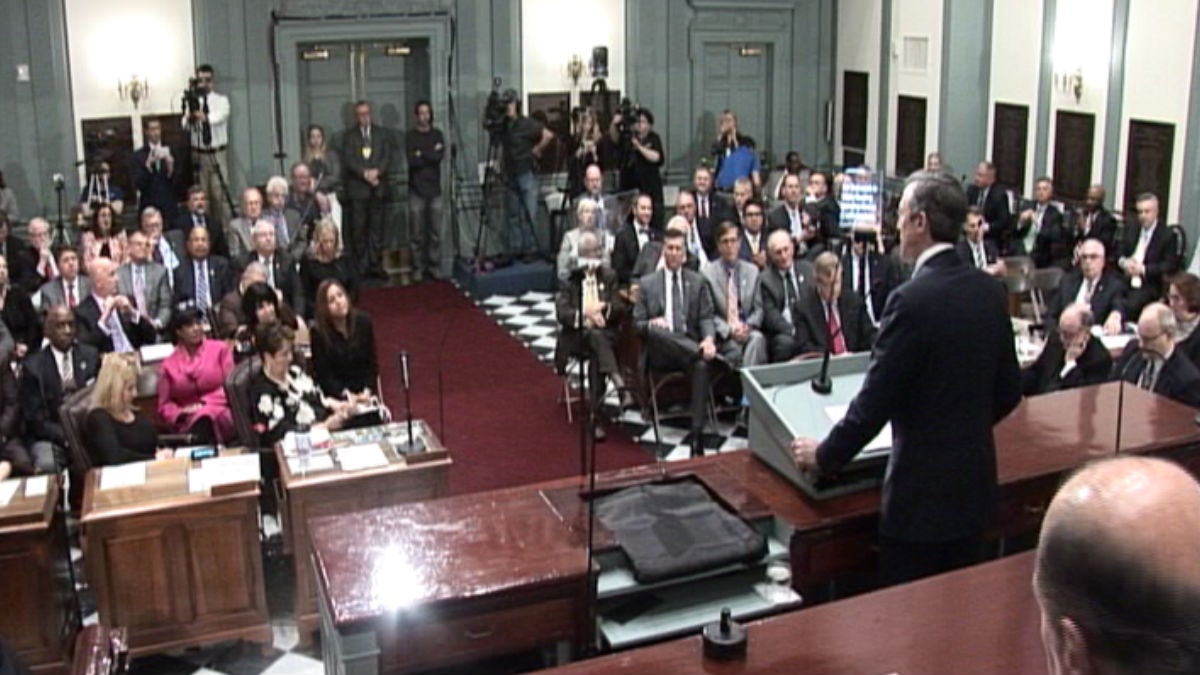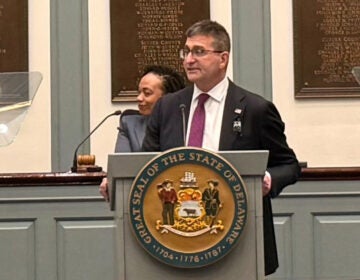Delaware lawmakers react to Gov. Carney’s address to General Assembly [video]

Members of the Delaware General Assembly watch as Gov. John Carney delivers an address to a joint session of lawmakers in Legislative Hall in Dover. (Paul Parmelee/WHYY)
Legislators are reacting to Gov. John Carney’s Thursday address to the General Assembly.
On Thursday Gov. John Carney, D-Delaware, gave his first address to a joint session of lawmakers in Legislative Hall in Dover. Democrats and Republicans reacted to his points on the budget and addressing the deficit, as well as other issues like criminal justice and education.
Carney started his speech by discussing his proposed $4.1 billion budget, and his plan to address the $385.5 million deficit through a “shared sacrifice” of spending cuts and revenue increases.
“Our north star in building this budget was making Delaware more competitive,” Carney said in his address. “While we went line by line, deciding which programs to cut and which to preserve, which taxes to raise and which to leave untouched, we asked ourselves the same question over and over again: ‘How will this decision impact our ability to grow our economy and compete?’”
While legislators agree something must be done to address the state’s deficit issue, they don’t agree on how to get it done.
Sen. Minority Leader Gary Simpson, R-Milford, said he doesn’t agree with the Governor’s statement that his budget plan is a “shared sacrifice,” with 50 percent placed on spending cuts and 50 percent placed on raising revenue.
He said he believes Delawareans would be hit hard by taxes, whether it’s coming from the state or the school districts.
Carney’s recommendations on personal income tax include eliminating itemized deductions and increasing the standard deduction by more than 50 percent. Each tax bracket also would be increased by 0.2 to 0.4 percentage points.
In addition, Carney also proposes reducing the senior property tax credit by $100.
There also would be a $22 million reduction in the Educational Sustainment Fund, which is a flexible account school districts can use for a number of programs, but Carney’s plan would allow school districts to cover the reduced amount by raising property taxes through legislation.
Simpson said he particularly dislikes the idea of shifting the $22 million costs back on the school districts, and allowing them to raise taxes—arguing unless an equalization formula is put in place, districts with less tax payers would be hit the hardest.
He also doesn’t approve of the proposed reduction of the senior property tax, which he said will “hit people hard.”
On the other hand, Simpson said a large chunk of savings for the government are on eliminating vacant positions, which doesn’t create much of a burden for the State.
“I think more of the burden is being placed on our constituents, whether it’s a tax increase from the state or the tax increase from the school district, it’s still a tax increase on our citizens,” he said.
State Sen. Colin Bonini, R-Dover, also said he would prefer more spending cuts than what’s proposed, particularly for items like employee healthcare and Medicaid, and less tax raising.
“Delaware has a spending problem, not a revenue problem,” he said. “The reality is the long-term solution is we have to pull back on spending, especially on Medicaid and state employee salaries and benefits. Until we address Medicaid and state personnel costs we’re going to be in the same budget situation year after year.”
However, Sen. Majority Leader Margaret Rose Henry, D-Wilmington, said she believes the Governor’s budget proposal mentioned in his speech is balanced, that making $6.5 million in cuts to state employee health insurance is fair during these times, and believes most of the tax increases are on higher earning residents, including large corporations that would face a tax increase.
“He’s talking about raising funds on the high level income people, so they can pay their fair share of state income tax, which is good,” she said.
“State employees will have to pay more toward their health insurance, but we have a very rich plan. In a time of shared sacrifice we too will have to take a hit in terms of how much more we pay for health coverage.”
State Rep. Helene Keeley, D-Wilmington, said she believes more could be cut from the Department of Education on the administrative side.
“There are positions there that are just not needed. In my opinion, I don’t think we need a purchasing person in every single department. I think that can be consolidated. I’m sure there are a couple other examples I could give that reflect that same scenario,” she said.
“Everyone wants to protect their districts, that’s fine—maybe a combination of districts is not a good move at this time, but maybe bringing those purchasing aspects and other administrative duties to one spot is the best way to go.”
Meanwhile, Keeley said she believes the speech was “very thoughtful,” and that the Governor is doing the best he can to solve a tough budget situation.
“For the last couple of years we’ve taken two steps forward and one step back. The announcement of DuPont merging with Dow Chemical and the loss of 1,100 jobs, and then Claymont Steel closing down, and with Chemours and Edge Moor closing down,” she said.
“So the Governor is in a tough situation, and the legislature is now in a tough situation, and we have to make hard decisions. As a negotiator and legislator for a while, you know when everybody walks away not happy you probably have a good piece of legislation. While I haven’t dove into budget 100 percent, what I have heard I feel so far it’s a balanced approach.”
Bonini said he was pleased the Governor is making tough conversations about the state’s budget issues and giving legislators and special interests a reality check.
“I’m very fond of John, and I think he deserves credit for addressing very difficult issues, and I think it takes political courage just to talk about these things,” he said.
“The fact we’re talking about cost drivers is incredibly important, so I was very glad to hear that, and I think his overall point, which is absolutely valid, is everything has to be about the economy, and if Delaware’s economy—I would argue, is one of the worst in the country—if we can turn this economy around, all these issues will solve themselves. Prosperity solves all these problems.”
In addition to addressing the budget, Henry also said she’s pleased the Governor discussed his a plan to protect prison guards, and raise their salary to make the career more attractive.
Carney’s budget proposal includes $4.7 million to increase hazardous pay for correctional officers, $2.3 million for 75 new officers at James T. Vaughn Correctional Center and Baylor Women’s Correctional Institution and $1.3 million for new equipment and training. Correctional officers’ salaries also would increase to more than $37,000.
During his speech, Carney said he will receive recommendations from an independent review of the hostage situation at the James T. Vaughn Correctional Center by June 1, and that it “will not be a report that collects dust on a shelf.”
However, Henry she also said more needs to be done to create opportunities for those entering the prison system.
“One of my concerns, and I’ve expressed this to him, is not forgetting the prisoners, because their concerns also have to be addressed,” she said. “To have more educational opportunities so people don’t have to be in prison and reduce some of our drug laws. We don’t have to lock people up for smoking marijuana—that could cut down on how many people we have in prison.”
On Thursday, Henry announced legislation to legalize and regulate marijuana, much like alcohol. The Governor has said he’s not in support of legalization at this time. However, Henry said she believes Carney still is open minded to the idea, and that he will host a town hall to discuss the topic.
“He wants to hear form the public,” she said. “I think he’s listening—his mind is not there yet, but he has an open mind.”
WHYY is your source for fact-based, in-depth journalism and information. As a nonprofit organization, we rely on financial support from readers like you. Please give today.





